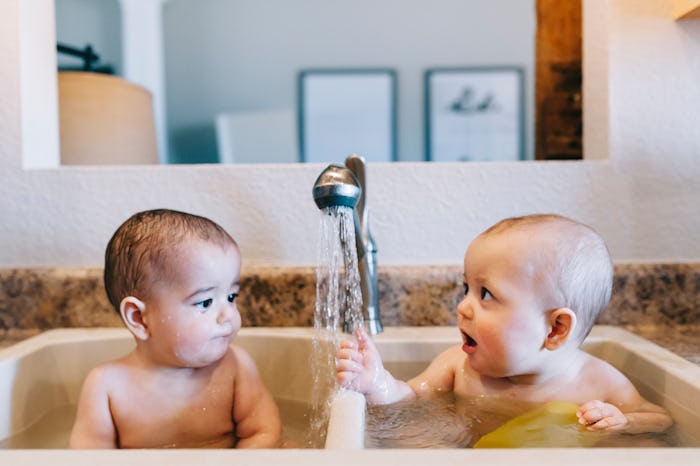Baby

Your Baby Should Totally Play With Other Babies When They Can
Maybe there's not a baby book club, but it certainly benefits your little one to play with others their age.
When my son Jack was 6 months old — back before social distancing — he really appeared to enjoy spending time with his little "friend" Fay, my best friend's daughter. Fay's almost the exact same age as him — 28 days older to be exact — and they always seemed to get a kick out of each other. I can't imagine not having our kids hang out together like we did, but what if you don't know any other babies your child's age? Should babies interact with other babies, and should parents make this socialization a priority? Now with the pandemic — where they're not supposed to interact — the social distancing of our babies from their peers feels like a pretty big deal.
Dr. Amy Learmonth, a professor and developmental psychologist, breaks down the benefits of babies interacting with each other when times were normal and says that not only should babies have social interactions with other babies because it's beneficial, but babies truly enjoy it. “They learn better by observation and imitation, and other babies provide opportunities to watch and interact with people who are at similar developmental levels. Babies also simply love interacting with other babies,” she says. “Babies gain experience with people who have the same or similar behavioral and emotional states. If they are of similar age, they will see someone just like them. If they are older, they love to be the role model, and if they are younger, it is often easier to learn new skills from someone who is not so far ahead of you.”
“Children start socially observing what is happening around them in infancy, and around 6 months, they are able to socially interact through expressions and reaching out to others,” says Dr. Shelli Dry, occupational therapist and director of operations at Enable My Child. “Children also tune in to the environment around them and will accommodate the emotional tone of the environment, which can be both positive and negative. For example, if a baby is happy and laughing, a lot of other babies join in, but the opposite is also true when a baby is upset. This emotional expression is the beginning of empathy and is crucial for healthy development.”
Honestly, the only potential negative to babies interacting with other babies, according to Learmonth, is that there’s the possibility your child will learn something you don’t want them to learn, like hitting or biting.
But now that it’s been so long since we’ve been able to safely interact with other people, including other people’s babies, it feels like this could negatively impact them in some way, especially given all the benefits of babies interacting with other babies. But Learmonth says not to worry — the baby and toddler groups worry her the least. “They like the interaction with other babies, and it is certainly good for them, but infants and toddlers can get everything they need from their interactions within the family,” she says. “They are learning the basics of how to be social beings. Although other babies are fun and the interactions are useful, babies are not at the point where they need the outside interaction like older children do.”
She adds that they’re probably the happiest of the age group with this “new normal” because their main goal in life at this time is to keep their caregivers close. And boy are they ever keeping us close. “The parents of the infants and toddlers may have the toughest job in quarantine because babies need attention all the time,” Learmonth adds. “Those parents who are trying to manage working from home with infants or toddlers probably need support the most."
The only negative impact Learmonth is worried about as far as babies and toddlers in quarantine right now is the language development with masks, and also about the fact that babies are exquisitely sensitive to their caregiver's distress (and most adults are feeling some level of elevated distress). “In the grand scheme of things, though, I think the babies will be some of the least impacted, as long as their families are not in dire financial condition,” she says.
Dry says one way to still have babies interact with other babies (and other people) is to include them in FaceTiming family and friends or watching videos of children playing and laughing (for a controlled amount of time). She adds, “Families can also take more time playing on the floor with their children and strengthening their relationships in order to help their children learn. They can work on some of the empathy-building and waiting and negotiation skills children in a group develop more naturally.”
Experts:
Dr. Amy Learmonth, PhD, professor of psychology at William Paterson University of New Jersey and developmental psychologist studying how children think and how their abilities change over time.
Dr. Shelli Dry, OTD, and director of clinical operations at Enable My Child.